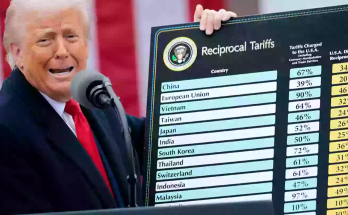In a heated discussion on The View, co-host Joy Behar ignited controversy by questioning why the United States is named after a “White man.”
Her comments came during a broader debate about a proposal to rename the Gulf of Mexico to the “Gulf of America.” The debate quickly turned into a historical and cultural discussion, drawing strong reactions from viewers, political commentators, and historians alike.
The Heated Exchange on The View
The conversation started when the panelists on The View discussed the latest push by some right-wing figures to rename the Gulf of Mexico as the “Gulf of America.”
The idea, promoted by a faction of nationalist conservatives, aims to reinforce American identity and diminish foreign influence in geographical naming conventions.
Joy Behar, never one to shy away from controversy, seized the opportunity to bring up a historical perspective, stating:
“We live in a country that was named after a White man. And now people want to erase even more historical names for their own agenda? Maybe we should be having a deeper conversation about history and how it’s shaped our national identity.”
Her remarks quickly divided the panel and the audience. Co-host Alyssa Farah Griffin, a former Trump administration official, pushed back, arguing that renaming the Gulf would be an act of national pride rather than historical erasure.
Whoopi Goldberg, another co-host, chimed in, emphasizing the need for inclusivity in historical narratives.
Historical Context: The Naming of America
The United States is named after Italian explorer Amerigo Vespucci, who played a key role in early European maps identifying the New World.

Unlike Christopher Columbus, whose legacy has been marred by controversy, Vespucci is credited with recognizing that the lands discovered by Europeans were not Asia but an entirely separate continent.
Historians have long debated the implications of this naming, with some arguing that it represents European colonialism’s dominance over indigenous civilizations.
Behar’s comments touched on these historical grievances, suggesting that the conversation about American identity should include more recognition of Native American and non-European influences.
The Reaction: Social Media and Political Fallout
Behar’s statement immediately sparked a firestorm on social media. Conservative commentators accused her of racializing an unrelated discussion, while progressives largely supported her view, saying it shed light on the Eurocentric bias in American history.
Fox News host Tucker Carlson called her remarks “anti-American rhetoric,” while liberal activists like Shaun King defended her perspective, arguing that American history has often been written from a European lens, erasing indigenous and Black contributions.
Twitter and other platforms saw a flood of comments, with JoyBehar trending alongside GulfOfAmerica. The debate extended beyond The View, with politicians also weighing in.

Senator Josh Hawley (R-MO) dismissed Behar’s remarks as “woke hysteria,” whereas Representative Alexandria Ocasio-Cortez (D-NY) called for “a broader conversation about how we recognize history.”
The Bigger Issue: The Renaming Debate
The push to rename the Gulf of Mexico has gained traction among some conservative groups who argue that the current name reflects unnecessary foreign influence.
The proposal, however, has been widely criticized by historians and scholars who point out that Mexico, as a neighboring country, has an undeniable cultural and historical link to the Gulf region.
Geopolitical analysts have also noted that such a renaming effort could strain U.S.-Mexico relations. Mexican officials have already dismissed the idea as “politically motivated nonsense.”
Should America Reconsider Its Own Name?
Behar’s comments inadvertently sparked another question: If conservatives want to rename the Gulf of Mexico, should progressives push to reconsider the name of the United States itself?

While changing the name of an entire nation is far-fetched, some scholars argue that there should be more emphasis on indigenous history and non-European influences in American culture.
In recent years, movements have called for more land acknowledgments, renaming of controversial landmarks, and revisiting how history is taught in schools.
Conclusion: A National Conversation About Identity
Joy Behar’s remarks on The View have reignited a debate about national identity, historical narratives, and the role of race in shaping American consciousness.
Whether or not the Gulf of Mexico will be renamed “Gulf of America” remains uncertain, but the conversation it has sparked goes far beyond geography.

With ongoing discussions about how history is taught and remembered, it is clear that the past—and who gets to define it—remains a contested battleground in American culture and politics.
What’s Next?
As debates around identity and historical recognition continue, expect further discussions on the renaming of landmarks, national identity, and who gets to shape the narrative of American history.
In the meantime, The View will remain a hotbed of passionate debates, keeping these conversations alive in the public sphere.



